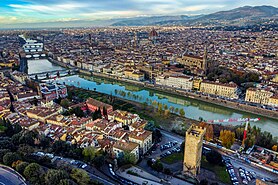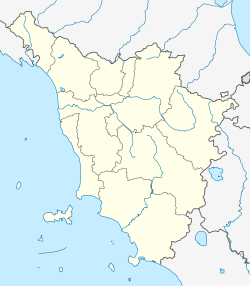
Back Florence Afrikaans Florenz ALS ፍሎረንስ Amharic Florencia AN Florentia ANG فلورنسا Arabic فلورنسا ARZ Florencia AST Firenze AVK Firenze Aymara
Florence
Firenze (Italian) | |
|---|---|
| Comune di Firenze | |
|
| |
| Coordinates: 43°46′17″N 11°15′15″E / 43.77139°N 11.25417°E | |
| Country | Italy |
| Region | Tuscany |
| Metropolitan city | Florence (FI) |
| Frazioni | Baronta, Callai, Galluzzo, Cascine del Riccio, Croce di Via, La Lastra, Mantignano, Ugnano, Parigi, Piazza Calda, Pontignale, San Michele a Monteripaldi, Settignano |
| Government | |
| • Mayor | Sara Funaro (PD) |
| Area | |
• Total | 102.32 km2 (39.51 sq mi) |
| Elevation | 50 m (160 ft) |
| Population (1 January 2022)[2] | |
• Total | 367,150 |
| • Density | 3,600/km2 (9,300/sq mi) |
| Demonyms | English: Florentine Italian: fiorentino (m.), fiorentina (f.) |
| Time zone | UTC+1 (CET) |
| • Summer (DST) | UTC+2 (CEST) |
| Postal code | 50121–50145 |
| Dialing code | 055 |
| ISTAT code | 048017 |
| Patron saint | John the Baptist[3] |
| Saint day | 24 June |
| Website | Official website |
Florence (/ˈflɒrəns/ FLORR-ənss; Italian: Firenze [fiˈrɛntse] ⓘ)[a] is the capital city of the Italian region of Tuscany. It is also the most populated city in Tuscany, with 364,073 inhabitants in 2024, and 990,527 in its metropolitan area.[4]
Florence was a centre of medieval European trade and finance and one of the wealthiest cities of that era.[5] It is considered by many academics[6] to have been the birthplace of the Renaissance, becoming a major artistic, cultural, commercial, political, economic and financial center.[7] During this time, Florence rose to a position of enormous influence in Italy, Europe, and beyond.[8] Its turbulent political history includes periods of rule by the powerful Medici family and numerous religious and republican revolutions.[9] From 1865 to 1871 the city served as the capital of the Kingdom of Italy. The Florentine dialect forms the base of standard Italian and it became the language of culture throughout Italy[10] due to the prestige of the masterpieces by Dante Alighieri, Petrarch, Giovanni Boccaccio, Niccolò Machiavelli and Francesco Guicciardini.
The city attracts millions of tourists each year, and UNESCO declared the Historic Centre of Florence a World Heritage Site in 1982. The city is noted for its culture, Renaissance art and architecture and monuments.[11] The city also contains numerous museums and art galleries, such as the Uffizi Gallery and the Palazzo Pitti, and still exerts an influence in the fields of art, culture and politics.[12] Due to Florence's artistic and architectural heritage, Forbes ranked it as one of the most beautiful cities in the world in 2010.[13]
Florence plays an important role in Italian fashion,[12] and is ranked in the top 15 fashion capitals of the world by Global Language Monitor;[14] furthermore, it is a major national economic centre,[12] as well as a tourist and industrial hub.
- ^ "Superficie di Comuni Province e Regioni italiane al 9 ottobre 2011". Italian National Institute of Statistics. Retrieved 16 March 2019.
- ^ "Bilancio demografico anno 2015 e popolazione residente al 31 dicembre; Comune: Firenze". ISTAT. Select: Italia Centrale/Toscana/Firenze/Firenze.
- ^ Paoletti, John T. and Radke, Gary M., Art in Renaissance Italy, Laurence King Publishing, 2005, p.79ISBN 1-85669-439-9
- ^ "Bilancio demografico mensile". demo.istat.it. Retrieved 29 September 2024.
- ^ "Economy of Renaissance Florence, Richard A. Goldthwaite, Book – Barnes & Noble". Search.barnesandnoble.com. 23 April 2009. Archived from the original on 4 April 2010. Retrieved 22 January 2010.
- ^ "Firenze-del-rinascimento: Documenti, foto e citazioni nell'Enciclopedia Treccani".
- ^ Spencer Baynes, L.L.D., and W. Robertson Smith, L.L.D., Encyclopædia Britannica. Akron, Ohio: The Werner Company, 1907: p. 675
- ^ "Florence | History, Geography, & Culture". Encyclopedia Britannica. Retrieved 3 November 2021.
- ^ Brucker, Gene A. (1969). Renaissance Florence. New York: Wiley. p. 23. ISBN 0-520-04695-1.
- ^ "storia della lingua in 'Enciclopedia dell'Italiano'". Treccani.it. Retrieved 28 October 2017.
- ^ Cite error: The named reference
britannica.comwas invoked but never defined (see the help page). - ^ a b c "Fashion: Italy's Renaissance". Time. 4 February 1952. Archived from the original on 25 November 2010. Retrieved 9 October 2013.
- ^ Kiladze, Tim (22 January 2010). "World's Most Beautiful Cities". Forbes. Retrieved 12 April 2011.
- ^ "Paris Towers Over World of Fashion as Top Global Fashion Capital for 2015". Languagemonitor.com. 6 July 2017. Retrieved 20 January 2016.
Cite error: There are <ref group=lower-alpha> tags or {{efn}} templates on this page, but the references will not show without a {{reflist|group=lower-alpha}} template or {{notelist}} template (see the help page).











